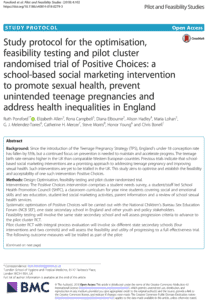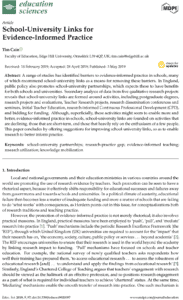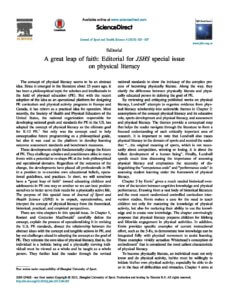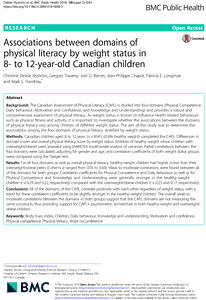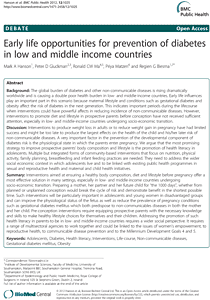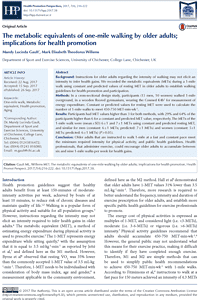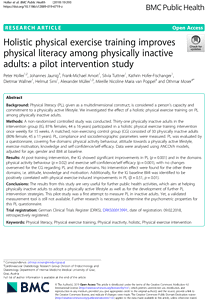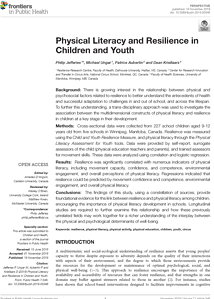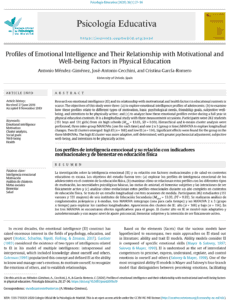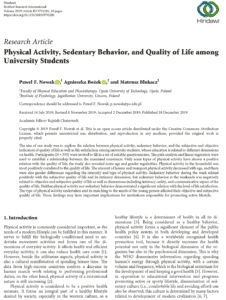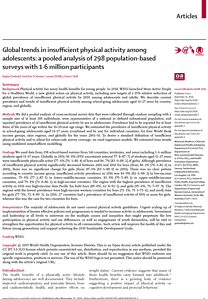-
Study protocol for the optimisation, feasibility testing and pilot cluster randomised trial of Positive Choices: a school-based social marketing intervention to promote sexual health, prevent unintended teenage pregnancies and address health inequalities in England
Background Since the introduction of the Teenage Pregnancy Strategy (TPS), England’s under-18 conception rate has fallen by 55%, but a continued focus on prevention is… -
School-University Links for Evidence-Informed Practice
Abstract A range of studies has identified barriers to evidence-informed practice in schools, many of which recommend school-university links as a means for removing these… -
Journal of Sport and Health Science (JSHS) – Special issue on physical literacy
Introduction The concept of physical literacy seems to be an abstract idea. Since it emerged in the literature about 25 years ago, it has been… -
Associations between domains of physical literacy by weight status in 8- to 12-year-old Canadian children
Background The Canadian Assessment of Physical Literacy (CAPL) is divided into four domains (Physical Competence, Daily Behaviour, Motivation and Confidence, and Knowledge and Understanding) and… -
Early life opportunities for prevention of diabetes in low and middle income countries
Background The global burden of diabetes and other non-communicable diseases is rising dramatically worldwide and is causing a double poor health burden in low- and… -
The metabolic equivalents of one-mile walking by older adults – implications for health promotion
Background Instructions for older adults regarding the intensity of walking may not elicit an intensity to infer health gains. We recorded the metabolic equivalents (METs)… -
Holistic physical exercise training improves physical literacy among physically inactive adults – a pilot intervention study
Background Physical literacy (PL), given as a multidimensional construct, is considered a person’s capacity and commitment to a physically active lifestyle. We investigated the effect… -
Physical Literacy and Resilience in Children and Youth
Background There is growing interest in the relationship between physical and psychosocial factors related to resilience to better understand the antecedents of health and successful… -
Emotional Intelligence Profiles and Their Relationship with Motivational and Well-being Factors in Physical Education
Abstract Research on emotional intelligence (EI) and its relationship with motivational and health factors in educational contexts is scarce. The objectives of this study were… -
Physical Activity, Sedentary Behaviour, and Quality of Life among University Students
Abstract The aim of this study was to explore the relation between physical activity, sedentary behaviour, and the subjective and objective indicators of quality of… -
Efficacy of School‑Based Interventions for Improving Muscular Fitness Outcomes in Adolescent Boys
Abstract: Efficacy of School‑Based Interventions for Improving Muscular Fitness Outcomes in Adolescent Boys Background It has been reported that boys’ and girls’ physical activity (PA)… -
Global trends in insufficient physical activity among adolescents
Background Physical activity has many health benefits for young people. In 2018, WHO launched More Active People for a Healthier World, a new global action…


